CD, CD Çalar, DVD, DVD Çalar, SACD, LP, Plak Çeşitleri ve Fiyatları

Upstart plugin developer Audiomodern is challenging the hegemony of Kontakt with its new sampler, Soundbox. Is Audiomodern Soundbox good enough to dethrone the Native Instruments mainstay?
There are three things you can’t avoid in this life: death, taxes, and shelling out the big bucks for Native Instruments Kontakt and its associated sample instruments. We love Kontakt, don’t get us wrong, but unless you’re a highly paid soundtrack composer for TV or video games, you may find it tough to justify the entry price. Plugin developer Audiomodern must feel the same as it’s just released a new Kontakt-like sampler with MPE at a fraction of the cost.
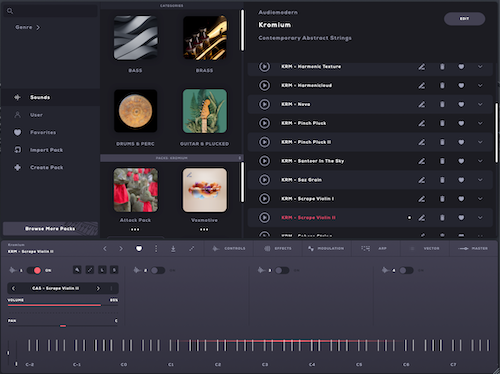
Actually it’s free. OK, we admit that’s a bit of a misstatement. The instrument itself (called the Soundbox Engine) is free but you have to buy a sound pack to get access. Don’t worry though, at €39 each (€29 intro price) the expansion packs are quite affordable. Also, that low price has no bearing on the quality of the sounds. They are uniformly gorgeous and undoubtedly worth the price.
Beautiful sounds aside, can Audiomodern Soundbox give Kontakt a run for its money? We lace up our best running shoes and try to catch up.
[quote align=right text=”Kontakt has never fully been challenged. Is that about to change?”]
Audiomodern Soundbox Overview
Audiomodern Soundbox is a sampler capable of playing four audio files at the same time. Each sample slot (called a layer) has its own set of controls and parameters which include amplitude envelope, glide (portamento), transpose, octave, and fine tune, plus pan and volume. Additionally, there are effects, modulation, an arpeggiator, and a Vector for cross-fading between layers, which we’ll look at more closely below. Finally, there’s a Master section.
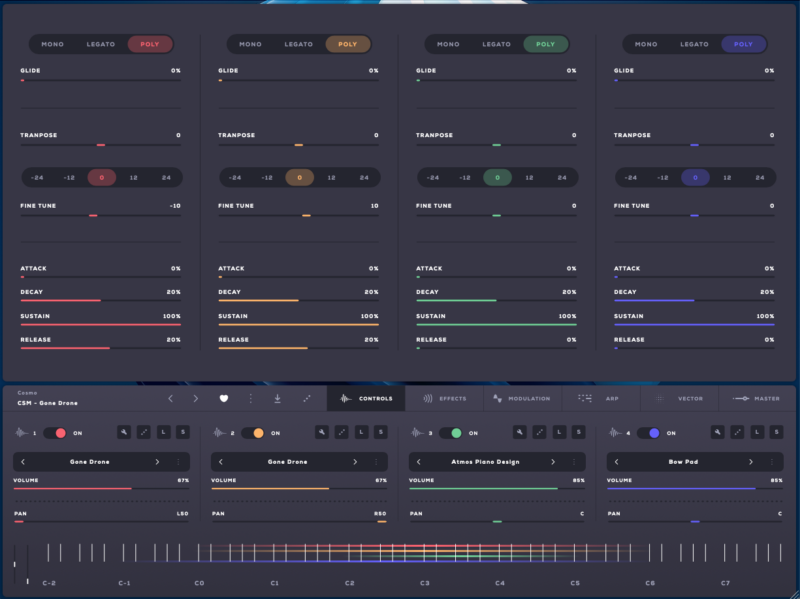
The effects are worth a mention, as they sound particularly good, especially the reverb algorithm licensed from Zynaptiq. Each sample layer (plus the Master) has four effects slots. Effects include the usual suspects such as delay, chorus, compressor and EQ, the latter particularly useful for helping the four layers sit together. There’s also a noise generator with multiple types and its own amplitude envelope. Usefully, you can have a layer with just noise for added texture.
Modulation, Arpeggiator and Vector
Unlike many of the other sections, the LFOs in the Modulation panel are freely assignable across the parameters of the four samples. There are six different LFO curves, including a step-based one. Assigning modulation requires right-clicking on a parameter rather than dragging a graphic as with instruments like Massive or Pigments but once you have the hang of it it becomes second nature. The Modulation section is also where you can set up the MPE functionality for polyphonic aftertouch but this was unfortunately not working in the version we looked at. Audiomodern has stated this will be addressed in a coming download.
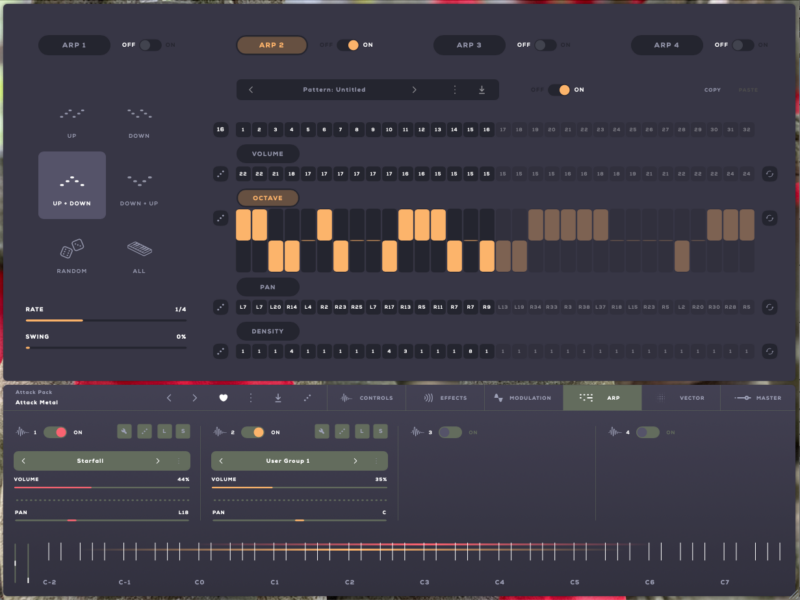
Being step-based almost like a sequencer, the Arp section is fairly detailed. It offers not only multiple arpeggiator modes (up, down, etc.) but a number of different parameters to affect on a per-step basis. There are lanes for Volume, Octave, Pan and Density, which is like ratchets. And, when you consider that there are separate arpeggiators for every sample layer, you can see how easy it is to get a lot of motion happening.
Lastly, the Vector section takes a cue from vector synthesis instruments of the past like the Kawai K1 and lets you cross-fade between the four samples. You can place the cursor with your mouse or choose an automatic motion path. There doesn’t seem to be a way to record your own custom motion though, which would be ideal for patches that have less than four samples (which is most of them, to be honest).
Sample Groups
Audiomodern Soundbox is more than just a sample player though, it’s a sampler, which means that you can import your own audio and create sample groups as you would in Kontakt or even Pigments.
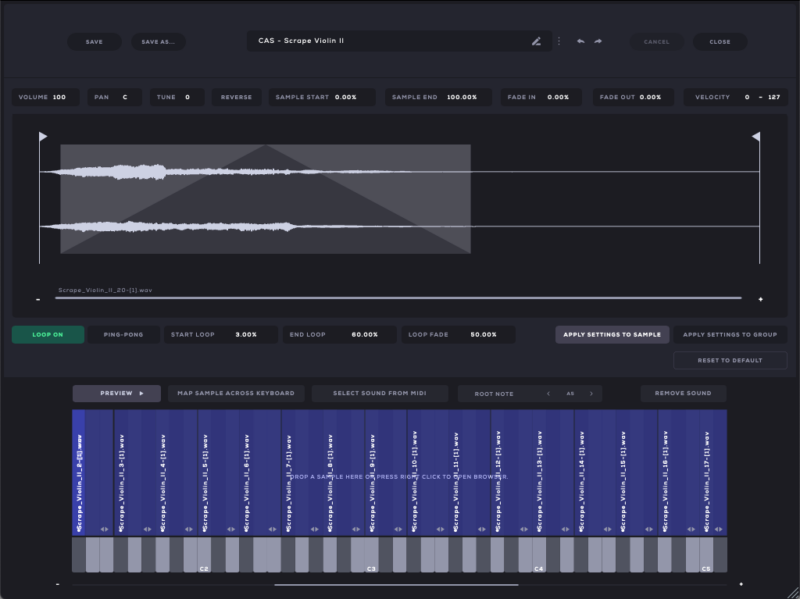
Each layer has its own sample group, which can support multiple audio files mappable by key or velocity layer. So you could, say, import different samples of the same synth sound with velocity layers to vary through changes in the source filter cutoff, for example. Unfortunately, Soundbox currently does not offer round robins, although the company has indicated it may add the functionality in a future update.
Lastly, you can do all of the usual editing to the samples themselves, such as changing start and end points, loops, fades and playback direction.
[quote align=right text=”Audiomodern Soundbox is more than just a sample player though, it’s a sampler”]
Audiomodern Soundbox Sound Packs
As previously mentioned, Audiomodern Soundbox has a slightly different pricing model than other instruments. Rather than paying for the plugin and getting the presets for free, you buy the presets and the Engine comes along for the ride. Thankfully, the sounds in the three launch packs are excellent throughout and all very much worth the €39 Audomodern is asking for them.
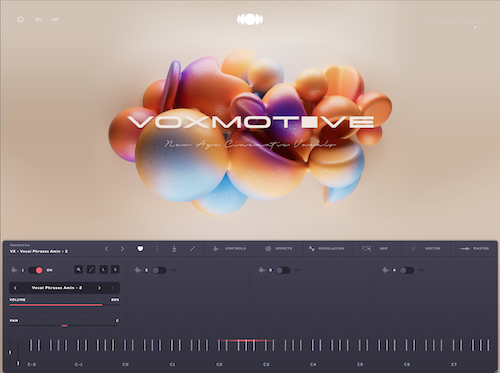
At the time of publication, there were three expansions available:
- Cosmo, which combines acoustic keyboard instruments with electronic synthesis
- Kromium, which focuses on string instruments and sound design
- Voxmotive, a pack of female vocal samples that includes effects
Here’s a quick example of how the three launch packs sounds. All sounds and effects are from Soundbox except the drums and 808 bass.
Soundbox song:
The launch packs all have a cinematic bent, but if that’s not your thing, Audiomodern promises that future expansions will be more varied, with loops on their way as well. We would love to see packs aimed at dance music producers among them.
Make Your Own Instrument
One of Audiomodern Soundbox’s marketing points is that it allows you to create your own instruments and packs to export and share with other users, ostensibly providing an alternative to Kontakt instruments.
We tried making our own instrument and it was fairly painless. Here’s how that went:
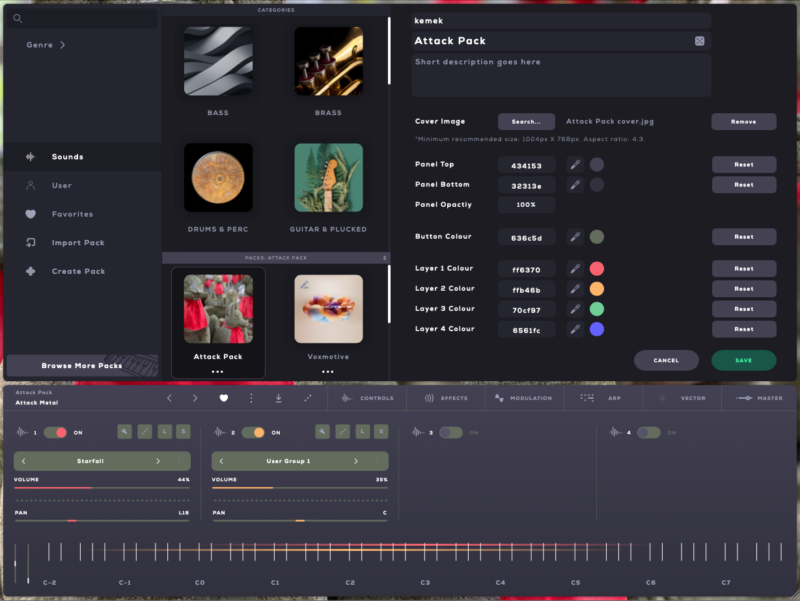
In the preset browser, start by clicking Create Pack on the left side. This will launch an edit mode where you can enter your own name, a name for the pack and a short description of it.
Next, customize the look of the pack. You can upload a custom image, as we did from a recent visit to a Japanese shrine. You can then change the colors of various buttons, layers and panels to match the image. Once you’re done, click save.
Now you can drag your presets into the pack. Once finished, export the pack and share it with other users. You can save it as a locked pack or one that people can edit.
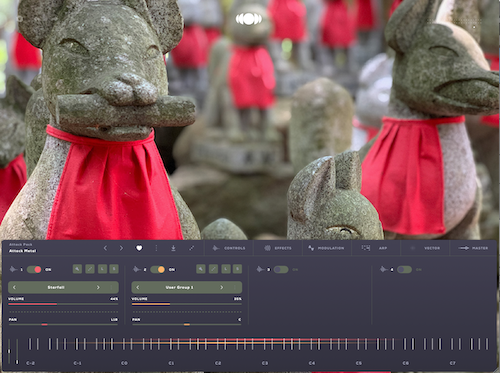
Here’s a sound we made using one layer from Audiomodern and one with a sample that we imported:
Audiomodern Soundbox: The Final Word
Audiomodern Soundbox is a sampler instrument with a lot of promise. The sound quality is excellent and the packs are uniformly lovely. Voxmotive is especially beautiful and is pretty much reason alone to pick this up. And, because of the unique pricing structure, if a solid and flexible vocal sound pack is all you need, then it’s perfect for you as is.
How does Soundbox fare as a Kontakt replacement? That’s where things get tricky. The lack of round robins is a real issue, as these are paramount for creating realistic performances of acoustic sampled instruments. The ability to really dig in and customize not only colors but the layout of instruments like Kontakt would be nice too. Finally, we’d love to see more of Audiomodern’s excellent technology get ported over from their other plugins as well, like Freeze. Perhaps with future updates we’ll see this happen.
As it stands, Audiomodern Soundbox and its three launch sound packs are insta-buys for anyone looking for unique and usable cinematic sounds. The fact that it’s also a fully featured sampler is a bonus. Will it eventually be able to topple Kontakt from its perch? Only time – and continued updates – will tell.
Find Audiomodern on Instagram and YouTube.
Find out more on the Audiomodern website.
Learn how we use Audiomodern to make IDM hi-hats.
[social-links heading=”Follow Attack Magazine” facebook=”https://www.facebook.com/attackmag” twitter=”https://twitter.com/attackmag1″ instagram=”https://www.instagram.com/attackmag/” youtube=”https://www.youtube.com/user/attackmag” soundcloud=”https://soundcloud.com/attackmag” tiktok=”https://www.tiktok.com/@attackmagazine”]
attackmagazine

Upstart plugin developer Audiomodern is challenging the hegemony of Kontakt with its new sampler, Soundbox. Is Audiomodern Soundbox good enough to dethrone the Native Instruments mainstay?
There are three things you can’t avoid in this life: death, taxes, and shelling out the big bucks for Native Instruments Kontakt and its associated sample instruments. We love Kontakt, don’t get us wrong, but unless you’re a highly paid soundtrack composer for TV or video games, you may find it tough to justify the entry price. Plugin developer Audiomodern must feel the same as it’s just released a new Kontakt-like sampler with MPE at a fraction of the cost.
Actually it’s free. OK, we admit that’s a bit of a misstatement. The instrument itself (called the Soundbox Engine) is free but you have to buy a sound pack to get access. Don’t worry though, at €39 each (€29 intro price) the expansion packs are quite affordable. Also, that low price has no bearing on the quality of the sounds. They are uniformly gorgeous and undoubtedly worth the price.
Beautiful sounds aside, can Audiomodern Soundbox give Kontakt a run for its money? We lace up our best running shoes and try to catch up.
[quote align=right text=”Kontakt has never fully been challenged. Is that about to change?”]
Audiomodern Soundbox Overview
Audiomodern Soundbox is a sampler capable of playing four audio files at the same time. Each sample slot (called a layer) has its own set of controls and parameters which include amplitude envelope, glide (portamento), transpose, octave, and fine tune, plus pan and volume. Additionally, there are effects, modulation, an arpeggiator, and a Vector for cross-fading between layers, which we’ll look at more closely below. Finally, there’s a Master section.
The effects are worth a mention, as they sound particularly good, especially the reverb algorithm licensed from Zynaptiq. Each sample layer (plus the Master) has four effects slots. Effects include the usual suspects such as delay, chorus, compressor and EQ, the latter particularly useful for helping the four layers sit together. There’s also a noise generator with multiple types and its own amplitude envelope. Usefully, you can have a layer with just noise for added texture.
Modulation, Arpeggiator and Vector
Unlike many of the other sections, the LFOs in the Modulation panel are freely assignable across the parameters of the four samples. There are six different LFO curves, including a step-based one. Assigning modulation requires right-clicking on a parameter rather than dragging a graphic as with instruments like Massive or Pigments but once you have the hang of it it becomes second nature. The Modulation section is also where you can set up the MPE functionality for polyphonic aftertouch but this was unfortunately not working in the version we looked at. Audiomodern has stated this will be addressed in a coming download.
Being step-based almost like a sequencer, the Arp section is fairly detailed. It offers not only multiple arpeggiator modes (up, down, etc.) but a number of different parameters to affect on a per-step basis. There are lanes for Volume, Octave, Pan and Density, which is like ratchets. And, when you consider that there are separate arpeggiators for every sample layer, you can see how easy it is to get a lot of motion happening.
Lastly, the Vector section takes a cue from vector synthesis instruments of the past like the Kawai K1 and lets you cross-fade between the four samples. You can place the cursor with your mouse or choose an automatic motion path. There doesn’t seem to be a way to record your own custom motion though, which would be ideal for patches that have less than four samples (which is most of them, to be honest).
Sample Groups
Audiomodern Soundbox is more than just a sample player though, it’s a sampler, which means that you can import your own audio and create sample groups as you would in Kontakt or even Pigments.
Each layer has its own sample group, which can support multiple audio files mappable by key or velocity layer. So you could, say, import different samples of the same synth sound with velocity layers to vary through changes in the source filter cutoff, for example. Unfortunately, Soundbox currently does not offer round robins, although the company has indicated it may add the functionality in a future update.
Lastly, you can do all of the usual editing to the samples themselves, such as changing start and end points, loops, fades and playback direction.
[quote align=right text=”Audiomodern Soundbox is more than just a sample player though, it’s a sampler”]
Audiomodern Soundbox Sound Packs
As previously mentioned, Audiomodern Soundbox has a slightly different pricing model than other instruments. Rather than paying for the plugin and getting the presets for free, you buy the presets and the Engine comes along for the ride. Thankfully, the sounds in the three launch packs are excellent throughout and all very much worth the €39 Audomodern is asking for them.

At the time of publication, there were three expansions available:
- Cosmo, which combines acoustic keyboard instruments with electronic synthesis
- Kromium, which focuses on string instruments and sound design
- Voxmotive, a pack of female vocal samples that includes effects
Here’s a quick example of how the three launch packs sounds. All sounds and effects are from Soundbox except the drums and 808 bass.
Soundbox song:
The launch packs all have a cinematic bent, but if that’s not your thing, Audiomodern promises that future expansions will be more varied, with loops on their way as well. We would love to see packs aimed at dance music producers among them.
Make Your Own Instrument
One of Audiomodern Soundbox’s marketing points is that it allows you to create your own instruments and packs to export and share with other users, ostensibly providing an alternative to Kontakt instruments.
We tried making our own instrument and it was fairly painless. Here’s how that went:

In the preset browser, start by clicking Create Pack on the left side. This will launch an edit mode where you can enter your own name, a name for the pack and a short description of it.
Next, customize the look of the pack. You can upload a custom image, as we did from a recent visit to a Japanese shrine. You can then change the colors of various buttons, layers and panels to match the image. Once you’re done, click save.
Now you can drag your presets into the pack. Once finished, export the pack and share it with other users. You can save it as a locked pack or one that people can edit.

Here’s a sound we made using one layer from Audiomodern and one with a sample that we imported:
Audiomodern Soundbox: The Final Word
Audiomodern Soundbox is a sampler instrument with a lot of promise. The sound quality is excellent and the packs are uniformly lovely. Voxmotive is especially beautiful and is pretty much reason alone to pick this up. And, because of the unique pricing structure, if a solid and flexible vocal sound pack is all you need, then it’s perfect for you as is.
How does Soundbox fare as a Kontakt replacement? That’s where things get tricky. The lack of round robins is a real issue, as these are paramount for creating realistic performances of acoustic sampled instruments. The ability to really dig in and customize not only colors but the layout of instruments like Kontakt would be nice too. Finally, we’d love to see more of Audiomodern’s excellent technology get ported over from their other plugins as well, like Freeze. Perhaps with future updates we’ll see this happen.
As it stands, Audiomodern Soundbox and its three launch sound packs are insta-buys for anyone looking for unique and usable cinematic sounds. The fact that it’s also a fully featured sampler is a bonus. Will it eventually be able to topple Kontakt from its perch? Only time – and continued updates – will tell.
Find Audiomodern on Instagram and YouTube.
Find out more on the Audiomodern website.
Learn how we use Audiomodern to make IDM hi-hats.
[social-links heading=”Follow Attack Magazine” facebook=”https://www.facebook.com/attackmag” twitter=”https://twitter.com/attackmag1″ instagram=”https://www.instagram.com/attackmag/” youtube=”https://www.youtube.com/user/attackmag” soundcloud=”https://soundcloud.com/attackmag” tiktok=”https://www.tiktok.com/@attackmagazine”]